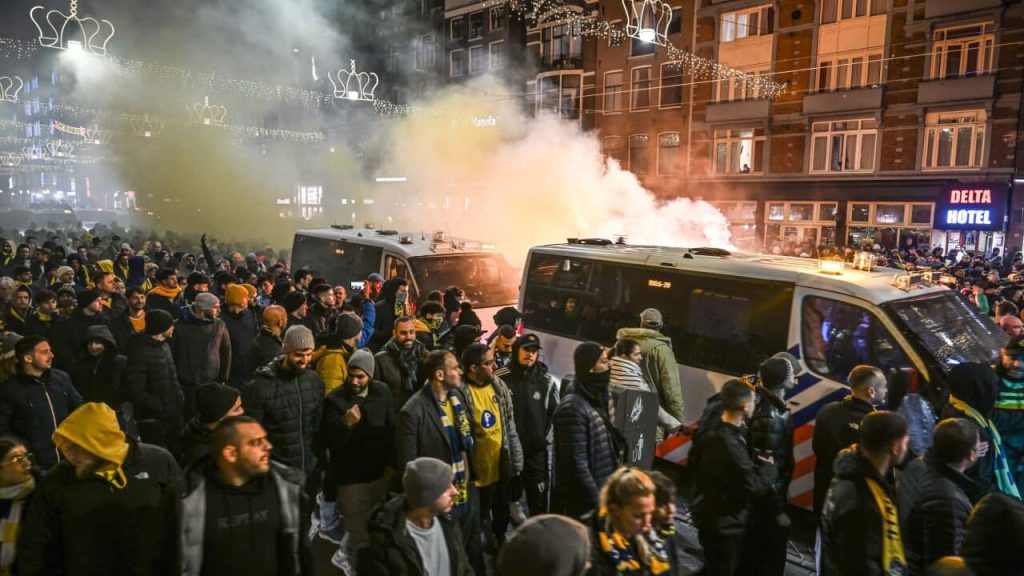Political football: Is misinformation about riots in Amsterdam further fueling social division?
Rioting and unrest spurred by a Europa League football match in Amsterdam has continued, one week since it first broke out. Despite calls for the series to pause, Paris is preparing to host the next match, ramping up police presence.
Meanwhile, international news outlets and social media accounts have shared vastly different versions of events surrounding the November 7 match, with decontextualised information and misinformation spreading rapidly.
‘Terrible antisemitic attack’
Riots broke out in Amsterdam after the match between Israel’s Maccabi Tel-Aviv and the Netherlands’ Ajax, with five people hospitalized and 63 arrested.
Mayor Femke Halsema said Maccabi supporters were beaten and kicked by gangs on scooters who performed “hit-and-run” attacks. She labeled the attacks as “antisemitic.”
Dutch Prime Minister Dick Schoof denounced the “terrible antisemitic attack” and canceled his trip to the United Nations Climate Conference COP29, citing the “major social impact” of the rioting.
European Union chief Ursula von der Leyen said she was “outraged” by the “vile attacks” and UN chief António Guterres was “shocked by the violence.” US President Joe Biden described the riots as “despicable” and said they “echo dark moments in history when Jews were persecuted.”
Jeremy Leibler, President of the Zionist Federation of Australia, described the events as “an organized pogrom directed specifically at Jewish people.” The Executive Council of Australian Jewry also called the violence “a pogrom” in a letter to the Netherlands Ambassador, adding that the Netherlands had “failed the Jewish people.”
What really happened in Amsterdam?
On Friday, Amsterdam’s acting police chief Peter Holla confirmed the first reports of unrest began on the evening before the match.
Israeli supporters gathered at Dam Square, burned a Palestinian flag, destroyed a taxi, and allegedly physically assaulted the Muslim taxi driver. Muslim taxi drivers gathered at a nearby casino, responding to a call on social media, and clashed with almost 400 Israeli supporters before police intervened.
Vision posted to social media show Maccabi fans setting off flares and fireworks, chanting in Hebrew “let the IDF win, we will f**k the Arabs”, and declaring there were “no children” left in Gaza.
On Thursday, Maccabi fans were filmed chanting anti-Arab slogans on their way to John Cruyff Arena. Police escorted over 2,500 fans and disbanded pro-Palestinian protesters waiting outside the stadium.
After the game and into the early hours of Friday, Maccabi fans were chased down and attacked by masked groups on scooters and e-bikes. Witness accounts and screenshots of mobile phone message exchanges suggested some were targeted because they were Jewish.
How misinformation and disinformation spurred viral outrage
Ms de Graaf filmed much of what she saw and. The post went viral, and her footage was included in reporting by outlets including CNN, BBC, Sky News, and the New York Times.
However, Ms de Graaf has accused the outlets of spreading disinformation by intentionally misidentifying the Maccabi supporters.
Sky News UK originally posted a segment on the unrest describing the group filmed in de Graaf’s footage as Maccabi fans. The segment was later wiped from their platforms and replaced with one describing the group as “hooded men.”
“That is terrible because it is the opposite of what happened in that footage,” said de Graaf.
She posted a message to the media on X, requesting an apology for the misuse of her footage, its removal, and the truth.
“Write it down: Maccabi supporters attacked Amsterdam citizens in front of Central Station after the game,” she wrote.
“Journalism is about finding truth. Not about making money on a twist of the script.”
‘Extremely dangerous’ language
The spread of misinformation was compounded by the language used to condemn the unrest.
Ms Schwartz said references to the Holocaust, and describing the violence as a ‘pogrom’, was “extremely dangerous”.
“There is a long history of Jewish people being subjected to pogroms,” she said.
“They were violent acts … that often led to Jewish people being forced out of different areas, particularly in Europe.
“It could be tempting for people to see people speaking about a Jew hunt, and speaking about going and attacking Jewish people, as an attack that is akin to these historical events.”
But Ms Schwartz said a critical component of both pogroms and the Holocaust was the “lack of state protection” of Jewish people, which allowed for “violent acts of ethnic cleansing”.
“In this instance, there was immediate swift action by Dutch authorities who immediately not only condemned the act … it’s very clear that Jewish people in the Netherlands do have support from the government,” she said.
“That is completely opposite to the way we saw the anti-Palestinian racism and the Islamophobic chants that had occurred before these attacks, where there was no global acts of condemnation from any world leaders.”
The impacts on communities in Australia
Australian Foreign Affairs Minister Penny Wong condemned the riots on X, noting that “violence in all its forms is unacceptable”.
“The Antisemitic attacks on Israeli soccer fans in Amsterdam overnight are abhorrent. My thoughts are with those affected and their families. We must stand together against antisemitism and hate in all its forms.”
While Ms Schwartz believes antisemitic violence should be condemned, she said “not all of the assaults had an antisemitic motive”. She believes some of them were responding to the violence and chants by some Maccabi fans.
She said the “selective reporting” of the attacks has real consequences for communities in Australia and around the world, fueling both Islamophobia and antisemitism.
“When you erase one form of racism and you only look at another form of racism, that being antisemitism, it increases divisions across racialized groups,” she said.
As unrest continues in the Dutch capital, the city hall is beginning their independent investigation, examining what spurred the violence and spotlighting police and intelligence services responses before, during and after the match.

